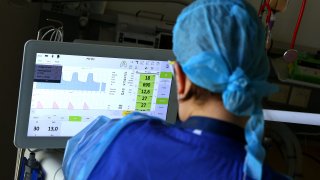
- Dr. Jeremy Faust said local governments should use real-time data to identify "circuit breakers" that trigger targeted restrictions to keep hospitals from being overrun.
- Many states and local governments implemented harsh restrictions on activities like indoor dining during the initial wave of Covid 19 in March 2020 but have held off making such moves again this time.
- "It's narrow, it's nimble, and it does an achievable thing that we all can get behind," Faust said.
Local governments can now take a more targeted approach to restrictions to help slow the spread of Covid while still keeping many businesses up and running, a frontline doctor told CNBC on Wednesday.
Dr. Jeremy Faust, an emergency medicine physician at Brigham and Women's Hospital in Boston and an instructor at Harvard Medical School, told Jim Cramer on "Mad Money" that local governments should use real-time data to identify "circuit breakers" that trigger targeted restrictions and keep hospitals from being overrun.
The Hurricane season is on. Our meteorologists are ready. Sign up for the NBC 6 Weather newsletter to get the latest forecast in your inbox.
"The idea is if someone has a heart attack or has Covid, we want them to be able to get treated and get the life-saving care that they deserve and that we can provide," Faust said. "But if the hospitals are overflowing for any reason, we can't do that and those are preventable deaths."
The discussion about the best way to balance health and economic concerns has been shoved to the forefront again by the rapid spread of the Covid omicron variant, which has caused record case levels in New York City and quickly became the most prevalent strain of the virus in the U.S.
Some airlines have asked the Centers for Disease Control and Prevention to re-examine the quarantine guidelines for vaccinated people as omicron spurs an acceleration of breakthrough cases.
Money Report
Many states and local governments implemented harsh restrictions on activities like indoor dining during the initial wave of Covid-19 in March 2020 but have held off making such moves again as mutations of the virus flare.
Faust created a dashboard that would show when hospitals are at capacity or when there is a critical level of viral spread. The dashboard can act as a signal to local officials to take temporary steps to limit the spread, such as reducing indoor dining capacity. If used correctly, the dashboard could allow local governments to slow outbreaks enough to keep hospitals running without widespread economic restrictions.
"It's narrow, it's nimble, and it does an achievable thing that we all can get behind," Faust said.
The Food and Drug Administration on Wednesday authorized a Pfizer pill to treat infected patients, giving the U.S. another tool to fight the virus. New medications and increased vaccination could be factored into the data and change the circuit breaker calculations, Faust said.
Sign up now for the CNBC Investing Club to follow Jim Cramer's every move in the market.
Disclaimer
Questions for Cramer?
Call Cramer: 1-800-743-CNBC
Want to take a deep dive into Cramer's world? Hit him up!
Mad Money Twitter - Jim Cramer Twitter - Facebook - Instagram
Questions, comments, suggestions for the "Mad Money" website? madcap@cnbc.com






